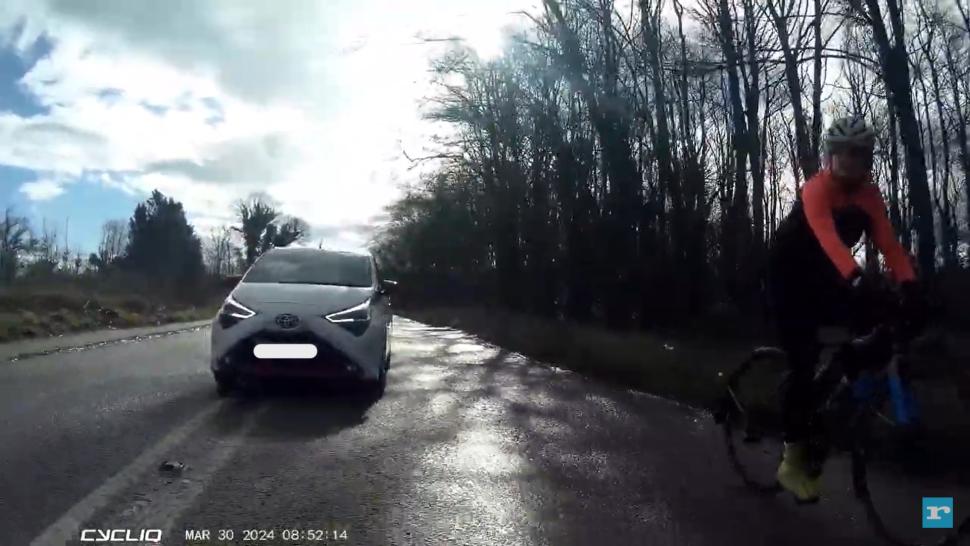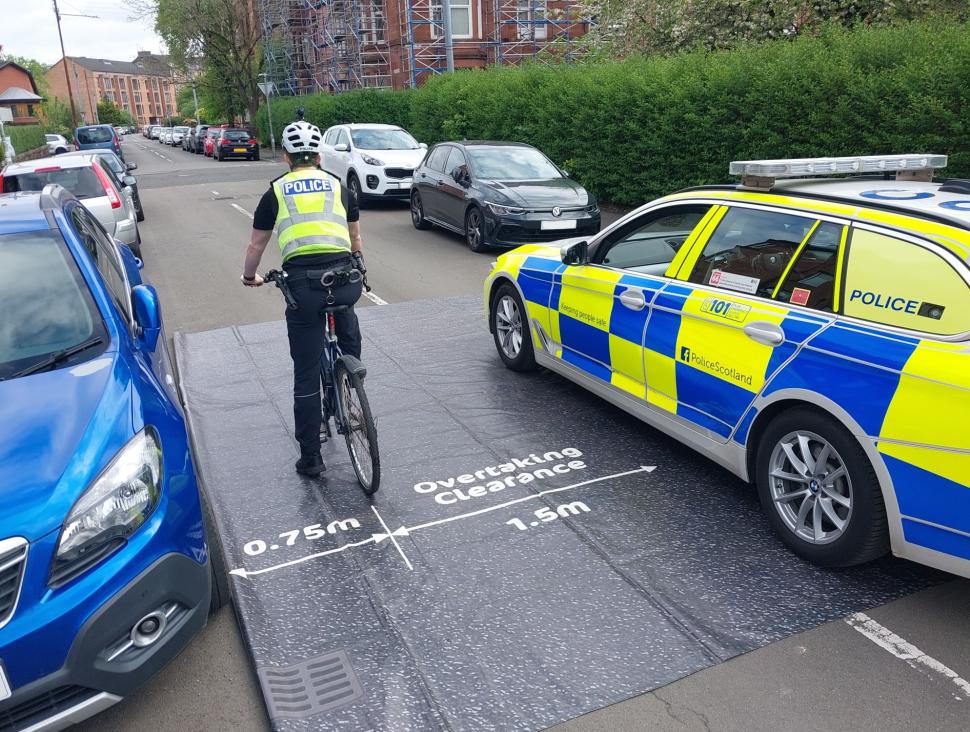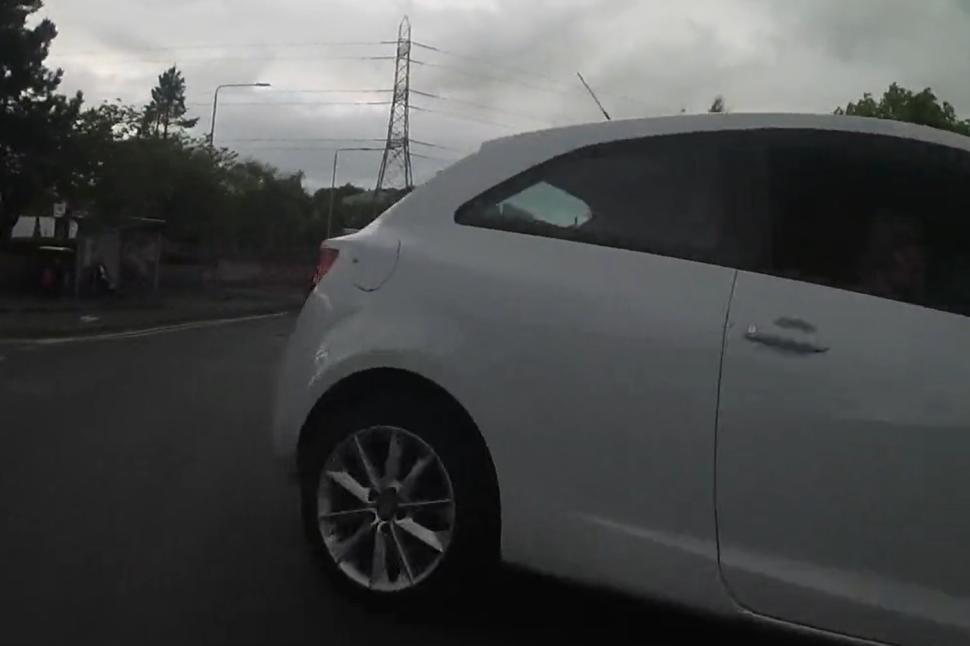- News
- Reviews
- Bikes
- Components
- Bar tape & grips
- Bottom brackets
- Brake & gear cables
- Brake & STI levers
- Brake pads & spares
- Brakes
- Cassettes & freewheels
- Chains
- Chainsets & chainrings
- Derailleurs - front
- Derailleurs - rear
- Forks
- Gear levers & shifters
- Groupsets
- Handlebars & extensions
- Headsets
- Hubs
- Inner tubes
- Pedals
- Quick releases & skewers
- Saddles
- Seatposts
- Stems
- Wheels
- Tyres
- Tubeless valves
- Accessories
- Accessories - misc
- Computer mounts
- Bags
- Bar ends
- Bike bags & cases
- Bottle cages
- Bottles
- Cameras
- Car racks
- Child seats
- Computers
- Glasses
- GPS units
- Helmets
- Lights - front
- Lights - rear
- Lights - sets
- Locks
- Mirrors
- Mudguards
- Racks
- Pumps & CO2 inflators
- Puncture kits
- Reflectives
- Smart watches
- Stands and racks
- Trailers
- Clothing
- Health, fitness and nutrition
- Tools and workshop
- Miscellaneous
- Buyers Guides
- Features
- Forum
- Recommends
- Podcast
 Motorist escapes punishment after alleged hit-and-run (credit - Alan Myles)
Motorist escapes punishment after alleged hit-and-run (credit - Alan Myles)Cyclists in Scotland finally set to be able to submit dangerous driving footage to online police portal… by autumn 2025 – two years after road safety tool scrapped amid claims police inaction was making Scotland’s roads “less safe”
After years of complaints that delays to the introduction of a dedicated road safety reporting tool and inaction on the part of the Scottish government and Police Scotland were putting the lives of cyclists across the country “at risk” and making the roads “less safe”, it has been confirmed that following a successful pilot scheme in Dundee, a new third-party video evidence-sharing tool will be rolled out across Scotland by this time next year.
While cyclists and other road users in England and Wales have been able to submit video evidence of road traffic offences via Operation Snap and other police reporting portals for a number of years (though some forces in those countries have only recently signed up to these methods), Scotland is yet to introduce a similar, easy-to-use, third-party digital reporting tool.
Instead, Scottish cyclists currently have to make do with the Police Scotland Online Reporting Form, a method often criticised by those who have used it as time-consuming, complicated, inconsistent, and reliant on the attitudes of the officers dealing with the complaint, potentially deterring riders from submitting footage given the increased time and inconvenience of reporting incidents to the police.
Speaking to road.cc in 2023, Scottish cyclist Deacon Thurston, known for posting videos of dangerous driving to social media, argued that “Police Scotland are simply not capable of accepting and acting on third-party video reports as effectively as most other UK police forces”.
He continued: “I can provide the clearest possible footage of a motorist using their phone while driving — irrefutable evidence of a device being used, registration plate clearly visible, driver easily identifiable.
“But, when you add up the time spent queuing to get through to 101, explaining to the call handler what’s happened, speaking to the officer who phones you back, having two officers come to your home to view the footage and take a statement — it can easily exceed two hours of my time per incident.
Thurston added that allowing third-party reporting for traffic offences would “massively improve” the system.
> Delays to introduction of online road safety portal putting cyclists “at risk”, says Cycling UK
With cyclists across the country and the likes of Cycling UK putting increasing pressure on authorities in Scotland to implement an Operation Snap-style portal, in March 2022 Police Scotland finally committed to piloting an online reporting tool, known as the National Dashcam Safety Portal, with support from the AA, RAC, and numerous other organisations.
However, just seven months later, in October 2022, Police Scotland announced that the project had experienced delays and was “under review” due to budget constraints.
And last November, Scotland’s Minister for Justice Angela Constance confirmed that the road safety portal had been scrapped, in favour of a ‘Digital Evidence Sharing Capability’ which will gather video evidence related to all crime-related activity in Scotland, and not just dangerous driving.
“A stand-alone portal is not the optimum route to create the capability for digital media submissions to be submitted by members of the public,” Constance argued at the time.
The decision to scrap the National Dashcam Safety Portal was heavily criticised by Cycling UK, who said Police Scotland’s “inaction has left Scotland’s roads less safe”.
“We are extremely disappointed that Police Scotland has gone back on its commitment to develop and roll out the National Dashcam Safety Portal across Scotland as a vital road safety tool,” Jim Densham, Cycling UK’s campaigns and policy manager for Scotland, said at the time.
“The technology is there, so it’s hard to understand why Police Scotland has refused to adopt it, when the case for its introduction is overwhelming: it will save them time and money, is widely supported by the public and road user groups and is used successfully everywhere else in Great Britain.”
But in a letter sent this month from Justice Minister Constance to Scottish Labour MSP Sarah Boyack, concerning one of Boyack’s constituents who experienced a “worrying incident involving a motorist” while riding his bike, the SNP minister confirmed that, following a “successful pilot” in Dundee, the Digital Evidence Sharing Capability (DESC) has already been expanded across Tayside and will begin a phased roll out across Scotland starting in the Forth Valley this month.
According to Police Scotland, the pilot scheme in Dundee handled “around 19,500 pieces of evidence” and freed up “almost 550 hours of police officers’ time”.
In the letter, seen by road.cc, Constance said that the roll out of the £33 million scheme is expected to be completed by autumn 2025.
“The DESC will make it easier for a member of the public to submit digital evidence as part of an investigation following a report to the police,” Constance continued. “DESC will enable development of further capabilities where scope to further improve the service to the public is identified.
“This is a world first for Scotland – a truly transformational programme where digital evidence is managed securely from crime scene to court room, benefitting victims, police officers, prosecutors, defence lawyers, court staff, and judges.
“During the successful pilot in Dundee, DESC allowed partners across the justice system to collect, manage and share digital evidence in a streamlined and efficient way, helping cases to resolve quicker and allowing victims to move on with their lives quicker. It has also freed up a significant amount of time for police officers, bringing additional capacity for frontline policing.”
While the DESC marks a step away from the standalone road safety portal envisioned by campaigners, in her letter to the Labour MSP, Constance nevertheless claimed that the Scottish government is “committed to making Scotland’s roads safe for all, and all motorists have a part to play in keeping our roads safe by driving responsibly and within the law.”
Nevertheless, the DESC has come under fire from cycling activists, who believe it will not be as strong or functional an option as the cancelled National Dashcam Safety Portal.
“Cancelling the NDSP and delaying until at least 2025, with a lesser replacement, puts responsible drivers, cyclists and pedestrians in Scotland at risk,” Cycling UK’s Densham said.
“Cycling UK is happy to work with the police to ensure that the people of Scotland receive the system that they were promised.”
After obtaining a PhD, lecturing, and hosting a history podcast at Queen’s University Belfast, Ryan joined road.cc in December 2021 and since then has kept the site’s readers and listeners informed and enthralled (well at least occasionally) on news, the live blog, and the road.cc Podcast. After boarding a wrong bus at the world championships and ruining a good pair of jeans at the cyclocross, he now serves as road.cc’s senior news writer. Before his foray into cycling journalism, he wallowed in the equally pitiless world of academia, where he wrote a book about Victorian politics and droned on about cycling and bikes to classes of bored students (while taking every chance he could get to talk about cycling in print or on the radio). He can be found riding his bike very slowly around the narrow, scenic country lanes of Co. Down.
Latest Comments
- Aluminium can 2 hours 10 min ago
So there's electronics and computers and motors for gear changes and pumping up or deflating tyres. Why not just motorise the whole bike and be...
- ktache 4 hours 6 min ago
Quest are showing the Paris Roubaix highlights at 11 both days.
- chrisonabike 4 hours 51 min ago
Pretty sure a lot of that "more space for motor vehicles" was because fewer motor vehicles (also marginally "smaller motor vehicles")....
- David9694 5 hours 38 min ago
I get the impression he represented himself, came over as a bit of an ass and received a ban, when a lawyer might have got him spared that.
- Rendel Harris 5 hours 41 min ago
Well if you ever get the chance and you feel yourself flagging give me a shout, happy to put in a shift.
- Laz 5 hours 49 min ago
OMG- that's so self centred....what about the brotherhood and sisterhood of enjoying a ride and sharing a happy wave with a fellow rider out...
- thax1 6 hours 16 min ago
Cycliq certainly seemed to let a lot of people down in the early days. I held off until the 12 Sport came out, but have been impressed....
- ktache 6 hours 18 min ago
My better half seems to like giving me pressies of Rapha clothing. I am wearing their casual hoodie right now, and very nice it is too. First off...
- thax1 6 hours 28 min ago
Push on through foot numbness and you then arrive at agonising foot cramp....
- Destroyer666 7 hours 5 min ago
Oh dear, to your own lack of understanding. I was not referring to your vague generalisation of "people", I was referring to a particular...



Add new comment
17 comments
I don't think DESC changes the requirement to phone 101, wait on hold, make a verbal complaint about bad driving, they schedule two officers to come and take your statement etc. but will simply mean you can send them the footage at that point through an online portal rather than USB stick.
It's not in any way comparable to the free national dashcam safety portal that Police Scotland could be using, for free, to take receipt of evidence of dangerous driving like other forces do
I'm thinking you may be correct on this one. I couldn't get my head around the £33 million outlay on this, as initially I was thinking of a portal to upload a clip and statement and going wow. That much. They could have saved so much money by just using the portal already in existence and paid two people to be trained and review the footage. Especially with a grant of £300k.
But I was wrong. They've gone and created a behemoth of a portal where all evidence can be uploaded and accessed by all and sundry in the justice system and polis. So you see a stushie on the street and record it. Here's where you go after Mr Polisman has sent you a link. You get close passed. Same again.
Much seems to be being made of this 'world first' and the reality is that you seem to still have the convoluted system of dialling 101, waiting for two polis to appear and give you a link. Below is what I found. What do you think?
New digital evidence system for Scotland's courts https://www.bbc.com/news/uk-scotland-64878070
https://www.gov.scot/news/digital-evidence-pilot/
https://www.gov.scot/news/improving-digital-evidence-sharing/
Will Police SCotland take any notice of submited footage? The past record on addressing poor driving doesn't give me much confidence. I'd be pleased to be proven wrong.
Based on the current experience, any portal will probably have the same criteria of 2mins each side of the incident and must be able to fit on an email ...
My experience with Police Scotland has ranged from next to useless to totally fecking abysmal.
Not sure about other forces but WMP only ask for 1 minute each side. I had to double check recently as one of the officers I hear from regularly asked me for smaller files in future as it was taking him too long to download them from the server. Previously I tried to make the video as long and high quality as possible within the upload limit.
Before Gloucestershire started using OpSnap they asked for videos to be put in dropbox. There were often problems with the system so I began to send short low res clips using email (24mb limit) saying that I had the original file if needed. This led to an almost immediate response from, usually, the same officer who always explained why he was taking no further action apart from one or two when he said he would send an NIP. He actally told me there was no problem with the quality of the video. This seemed to me to be a much more efficient system and saved us both a great deal of time. It also meant I was sure that the video had actually been viewed, I wasn't always convinced before that and with some OpSnap reports since during 2023.
I have considered sending a short clip along with the long ones now they are using OpSnap but I haven't tried it yet.
Reporting to WMP a couple of years ago was pointless too but they seem to have really got their act together now.
To be fair to Gloucestershire I have to say that they have got better in the last few months. They seem to have a new dedicated officer who now lets me know if they are going to take action (not what action) and sometimes lets me know why they are not taking further action, mostly close passes which they still seem reluctant to act on. I haven't given up hope yet but thank you for the encouragement, it's appreciated.
You're potentially helping every local cyclist even if they will never know so you're very welcome. Funnily enough today I replied with the exact same phrase to a WMP officer who finished the email with "Many thanks for the submissions, keep them coming."
It's a shame about the close pass reluctance as I imagine most of us find that the worst part of road riding.
I now get updates saying action has been taken (occasionally stating what action) on 90% of my reports so I assume the other 10% aren't being acted on. I was told they didn't procede with a couple in time because they were swamped with reports but that's a good thing in some ways and I used to hear from only 2 officers but now there are at least 6.
GMP require a mere thirty seconds on either side of the reported incident. Also, to protect my privacy, I've even submitted one incident with less than 15 seconds at the start. Therefore they can be flexible with good reason.
I usually like to give a touch more than the thirty-second minimum. But, because I often submit footage from two cameras, I am at risk of providing overly long videos if I am not careful.
Deleted
i should learn to read the article more thoroughly before posting!
Colossal waste of money as polis Scotland won't give a flying duck about close passes on vulnerable road users.
Sad but true.
£33 million???
They need a lot of waste bins, "NFA" forms, people to review all the rejections to certify they are justified and giant storage space to hold the submissions (/dev/null)...
Don't these things always go over budget and also delayed by years, so £33 million is just the minimum.
What's the betting they've managed to hand out fewer than 10 close pass fines by 2030?
That scraping sound we can all hear - it's the police dragging their heels